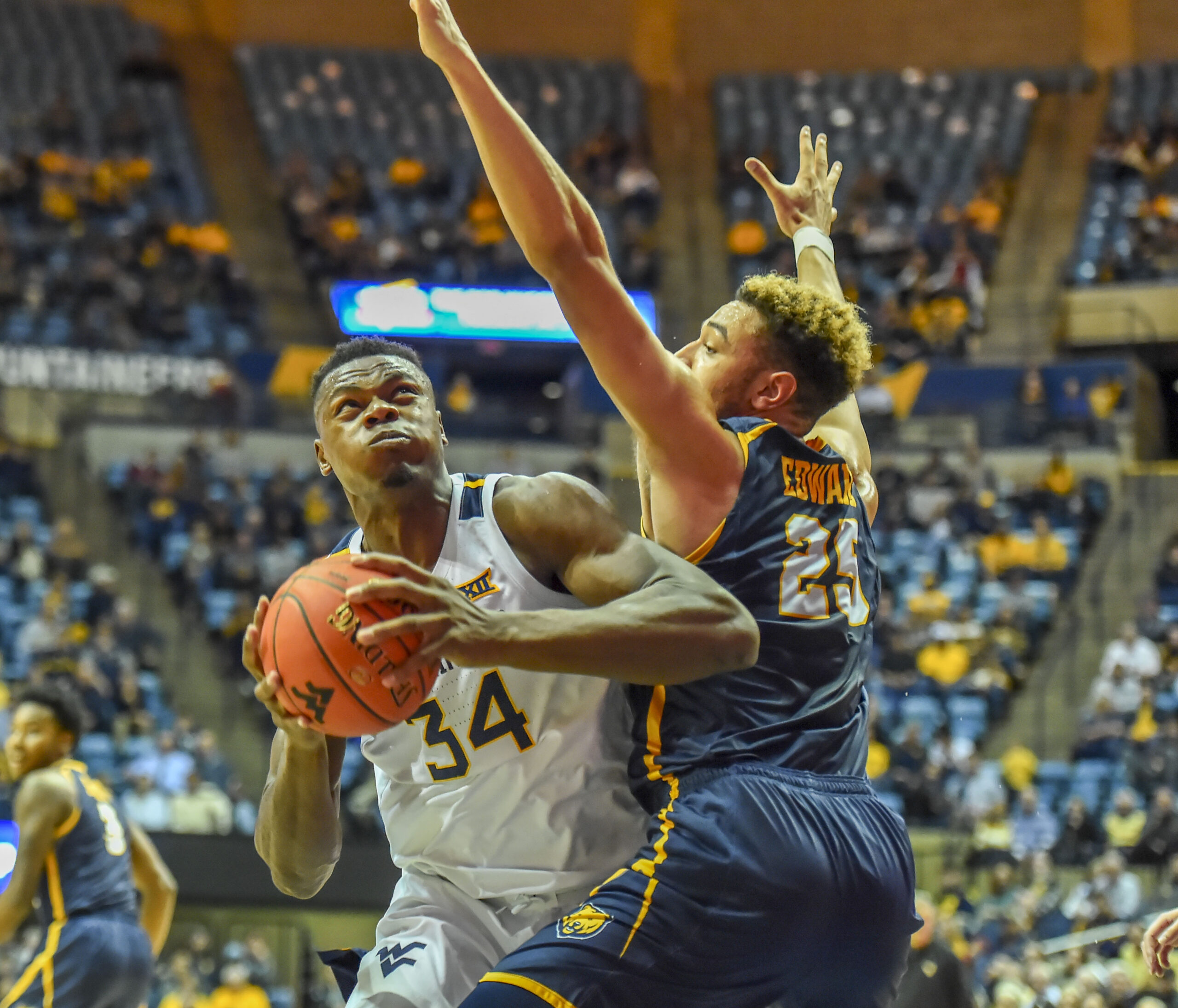MORGANOWN, W. Va. — The work begins each day for West Virginia’s Oscar Tshiebwe, as he and WVU assistant Erik Martin continue the journey of developing the 6-foot-9 forward from powerful freshman to a well-polished basketball player.
Spin left and shoot. Spin right and shoot. Power through contact and dunk.
All of it looks so simple when there’s just one or two guys out on the court, but it becomes a whole other world when Tshiebwe is surrounded in a game by two or three defenders keyed on slowing him down.
“Coach Martin is helping me a lot,” Tshiebwe said. “He’s really changed my game.”
To the point that Tshiebwe simply smiles when he recounts his early days on the WVU campus and when he first started playing against teammate Derek Culver.
“When I first got here, I couldn’t do anything against Derek,” Tshiebwe said. “In high school, I would catch it, turn and dunk it. Against Derek, he kept blocking my shots.”
Then come the bank shots … tons of them.
“You’re probably not going to believe me, but I shoot 1,000 bank shots every day,” Tshiebwe said. “My arms and my shoulders get so tired. That’s how tough it is.”
A year ago, none of this was needed for Tshiebwe, a native of the Democratic Republic of Congo, who grew up playing soccer. He didn’t pick up a basketball until he was in the seventh grade, and even then he showed up to his first practice in soccer cleats.
Playing at Kennedy Catholic in Hermitage, Pa., Tshiebwe was already bigger, stronger and faster than anyone guarding him.
There was little need to develop a bank shot.
“I never had to use the bank shot in high school,” Tshiebwe said. “If I caught the ball in the low post, I had little guys on me.”
He turned into a McDonald’s All-American having rarely faced consistent challenges.
That changed the minute he began college and so the work began.
“He’s had two years of organized basketball,” WVU head coach Bob Huggins said. “Quite frankly, he’s been better than everybody he’s played against. This is all new to him. He’s never played against a guy like Derek. To say that he’s hasn’t picked up some bad habits, he has, but it was because he was so much athletically superior to who he played.”
Tshiebwe said much of the constant work builds up his muscle memory, as well as helping him to build confidence in games.
When the season first started, he admits he was spending too much time thinking about what move he was supposed to make.
“I don’t even think about it now,” Tshiebwe said. “In the beginning, I was thinking about it a lot. The more you play and the more you do it, it becomes much easier.”
He’s averaging 12.3 points and 9.7 rebounds heading into Saturday’s game against St. John’s (5-2) at Madison Square Garden.
Those numbers have been produced through an on and off cycle, where’s he’s followed a great game with a subpar encore.
“I’ve tried to figure that out and it’s tough,” Tshiebwe said. “When you play a good game, the next team you play, they’re going to do something else. You’ve got to have things to use each game. You can’t just use the same thing every time. I’ve started to figure that out now. I think I’ll be good.”
The battle
West Virginia (7-0) will try to get the Big 12 on the scoreboard in the inaugural Big East/Big 12 Battle on Saturday.
The challenge series between the two conferences began Wednesday, with Georgetown beating Oklahoma State and DePaul knocking off Texas Tech in overtime.
The series will continue until Dec. 21, when it concludes with Kansas traveling to Villanova and Texas traveling to Providence.
“Obviously they’re made for TV,” Huggins said. “I think it’s a chip the conference throws out there to enhance the television package. I think it’s good.”
Big Ten and ACC schools moved to 20-game regular seasons for 2019-20, something the Big 12 — with just 10 schools — is unable to do without adding at least one more school to the league.
The Battle, packed in with the Big 12/SEC Challenge in January gives Big 12 schools a chance to keep their strength of schedule comparative to the ACC and Big Ten.
“I think the thought behind this was we have 18 league games and most other people have 20,” Huggins said. “These two games against quality opponents, we kind of have our 20. We’re not shorted anywhere, because we have less so-called quality games than the people who have 20.”
TWEET @bigjax3211




